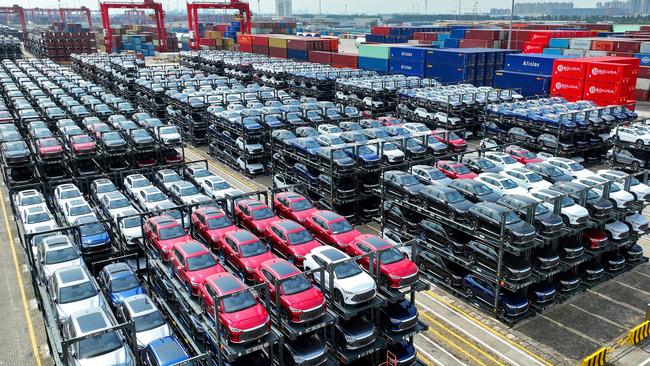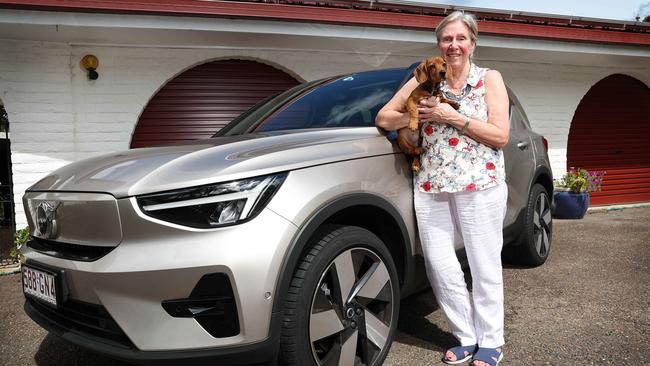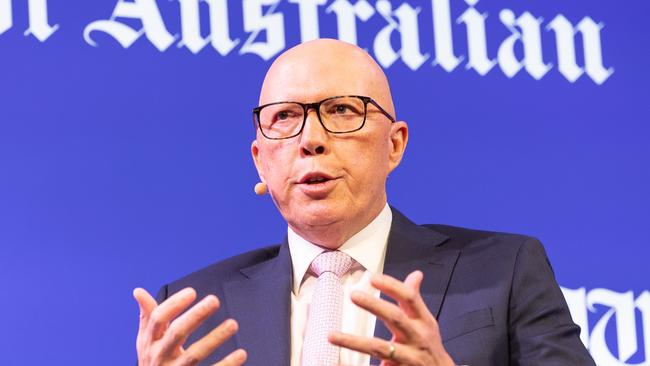EV Council criticises Peter Dutton’s pledge to abolish fines under NVES
Coalition leader Peter Dutton’s latest pledge to wind back vehicle measures imposed by PM Anthony Albanese has been slammed.
Motoring
Don't miss out on the headlines from Motoring. Followed categories will be added to My News.
The Electric Vehicle Council has strongly condemned Opposition Leader Petter Dutton’s pledge to abolish fines associated with Australia’s New Vehicle Efficiency Standard (NVES), warning it would significantly raise the cost of living for millions of Australians.
The New Vehicle Efficiency Standard (NVES), introduced by the Albanese government, came into effect on January 1, 2025.
Under the scheme, carmakers have until July 1, 2025 to start meeting CO2 targets, with financial penalties kicking in for those who fail to meet those targets.
Under the current legislation, if automakers exceed an average carbon emissions target on the vehicles they sell each year, they will be penalised $100 for every gram per kilometre CO2 for every vehicle which exceeds the target.
The goal is to push more fuel-efficient vehicles including electric vehicles (EVs) and hybrid models into the Australian market and bring the country in line with the emissions standards of Europe.
MORE: Massive company halts US exports

Dutton has been critical of NVES from the outset, claiming it’s a “tax on utes and SUVs” that will inflate prices on popular family and work vehicles.
The Coalition and Dutton argue that the penalties placed on car manufacturers is unnecessary and will lead to higher prices for consumers, particularly in the family and small business sectors.
“This is a tax on families who need a reliable car and small businesses trying to grow. Instead of making life easier, Labor is making it harder and more expensive,” Mr Dutton said.
“A Coalition government will scrap this tax, so Australians can keep more of their hard-earned money when purchasing a new car.”
Government modelling shows that some vehicles such as the Toyota RAV4 could theoretically cost up to $9,700 more if manufacturers pass on the penalties.
But that modelling may be wide of the mark as the RAV4 is only available as an efficient hybrid car that uses far less fuel than conventionally powered vehicles.
MORE: Top car brand named Australia’s best

Polestar Australia Head Scott Maynard said the Coalition’s policy is not about protecting families.
“It’s about protecting carmakers which have been slow to move on efficient or electric vehicles from fines,” he said.
Maynard said the standards are not “radical” but the “bare minimum” of what’s required for Australia to catch up with global standards.
“Without proper penalties in place to enforce these standards, we’ll remain behind the curve. Removing financial penalties creates policy theatre, not substance.
Standards without accountability aren’t standards, they’re suggestions that can easily be shrugged aside.” he said.
“Guidelines won’t drive the innovation and market transformation Australia desperately needs. Previous attempts at a voluntary standard are proof.”
Without penalties, the EVC argues that Australia risks becoming a “dumping ground” for inefficient, fuel guzzling vehicles.
EVC chief executive officer Julie Delvecchio said that weakening the NVES would deprive Australians of the opportunity to save thousands of dollars annually by driving more affordable and greener vehicles.
MORE: Dutton’s price promise to Aussie drivers

“The NVES doesn’t work without the credit and penalty system. Removing fines from the NVES is like having road rules without enforcement — no consequences for breaking the rules and no motivation to follow them,” Ms Delvecchio said.
Delvecchio explained that NVES was designed to promote a more competitive and affordable market and without the system, manufacturers could return to focusing on less-efficient models.
“Australians are voting with their feet by getting into more fuel-efficient cars which save them money, especially EVs which slash costs for Australians by up to $3,000 every year.” she said.
“All Australians benefit from the NVES, but the ones who benefit most are those living in the outer suburbs who commute longer distances and are looking to save money.”
The EVC argues that the removal of NVES fines would not only increase individual cost but also have a long-term economic impact.
The standard is projected to save Australians $114 billion in fuel and maintenance savings.
Originally published as EV Council criticises Peter Dutton’s pledge to abolish fines under NVES


